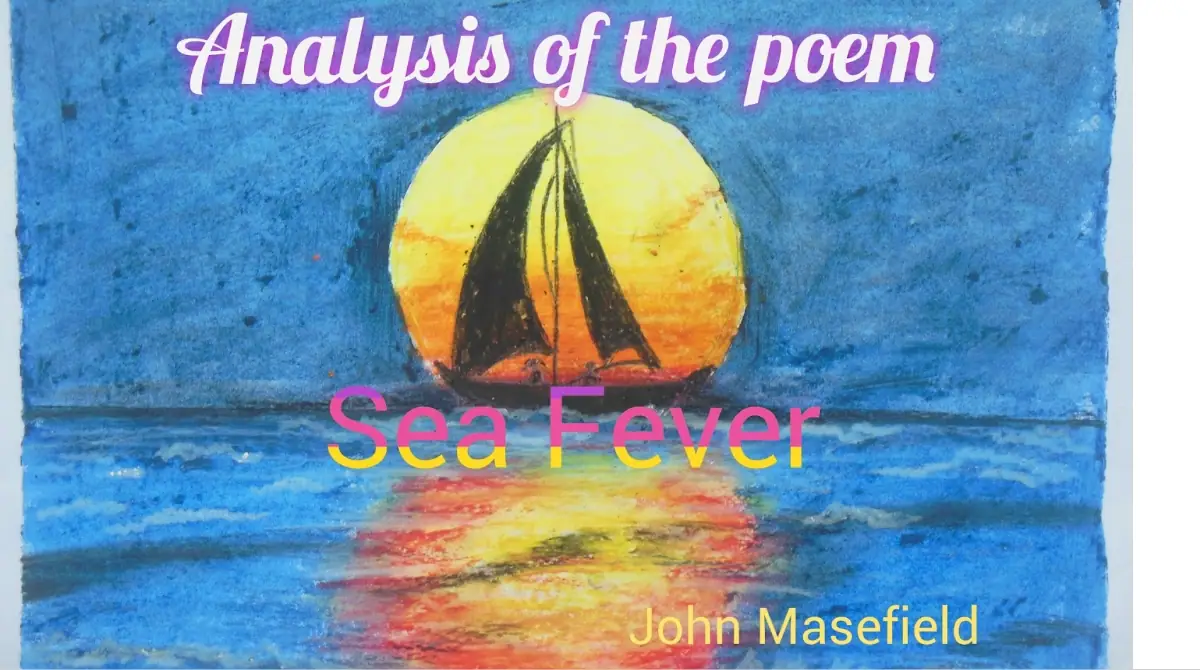Sea Fever Poem Questions Answers and Analysis
Here is the detailed study of the poem Sea Fever. To get the complete explanation of the poem Click on the play button below.
Here are some important questions answers from the poem Sea Fever by John Masefield to analyse the poem in details.
Sea Fever Poem Questions Answers
(1) Why does the poet repeat the line “I must go down to the sea again”?
Ans:- The poet repeats the line thrice in the poem to emphasize the poet’s innate desire for sailing over the sea. It also shows that the poet is deeply moved by the adventurous and romanticism of sea-voyage.

(2) What according to the poet are the pleasures of sailing?
Ans:- The poet enjoys the wheel’s kick, windy song, white clouds flying, flung spray, blown spume and sea-gull’s crying.
(3) What does the word ‘star’ refer to in the poem?
Ans:- The poet, John Masefield wants a star to steer the ship in his sea-voyage. Here ‘star’ refers to the ‘Pole Star’ that always appears in the North sky. The mariners take the help of the Pole Star to find out the proper direction.
(4) What is the time of the day does the poet want to start his journey?
Ans:- The poet wants to start his sea-voyage at the time of dawn when there will be grey mist at the sea’s face.
(5) How is the call and why it can not be denied?
Ans:- The poet can hear the call of the running tide. The call is wild and clear which always allures the poet to sail over the sea. So, it can not be denied.
(6) What does the poet want for his sea-voyage?
Ans:- The poet wants a tall ship and a star that is the Pole Star for his sea-voyage. He also wants the lonely sea, wheel’s kick, the wind’s song and the white sail’s shaking with a windy day and white clouds flying.
(7) What sort of life does the poet desire?
Ans:- The poet wants a vagrant gypsy life where he can feel a sense of freedom like the gull’s and whale’s in the sea.
(8) Explain the line – “”Where the wind’s like a whetted knife.”
Ans:- According to the poet, out in the open sea the wind is icy cold and blows very strongly. The poet feels very cold and it seems to him that icy cold wind cuts him like a sharp knife.
(9) What does the poet want to listen?
Ans:- The poet wants to listen the song of wind, the cry of seagull and joyful tales from his fellow sailors.
(10) How does the poet compare the sea journey?
Ans:- The sea journey has been compared to human life with ups and downs and many obstacles.
(11) What does the poet want to hear from his fellow rovers?
Ans:- The poet wants to hear joyful tales from his laughing fellow rovers.
(12) What does the poet want after the end of sea-voyage?
Ans:- After the struggling part of sea-voyage when the poet will take rest, he wishes for a quiet sleep and sweet dream.
(13) Explain the last line of the poem, “And quiet sleep and a sweet dream when the long trick’s over.”
Ans:- After the end of his sea-voyage, the poet wishes for a quiet sleep and sweet dream. Significantly, it refers to the journey of human’s life which is full of struggles and challenges and it must be desired to be ended with a peaceful eternal rest.
(14) What type of ship does the poet want in his sea voyage?
Ans:- The poet wants a tall and strong ship which is capable enough to stand against the turmoil condition of the sea.
(15) What does the poet suggest by “Wheel’s kick”?
Ans:- The sea is turbulent with the terrible wind and the ship is sailing on this wild sea. The sea is so ferocious that even the steering wheel of the ship becomes untamable. This what the poet suggests by ‘Wheel’s kick’.
(16) What does the “blown spume” suggest?
Ans:- The poet describes a turbulent sea. The impact of the strong wind forces the waves to rise and roll breaking into foams. The expression “blown spume” suggests this.
(17) Explain the term “long trick”.
Ans: In the poem, “Sea Fever” the term ‘long trick’ refers to the rough long journey over sea. But the term has a deep meaning. Significantly it suggests the journey of human life which is full of struggles and challenges.
(18) Why is the mariner’s life viewed as the ‘vagrant gypsy life’ ?
Ans: The mariner’s life is a free spirited life from the bondage of life. He can feel a sense of freedom in living by the ocean. The emotion elicited by the ocean gives the mariner a complete satisfaction and nothing else can please him.
(19) What does the title ‘Sea Fever’ mean?
Ans: The title of the poem, “Sea Fever” reveals the poet’s irresistible desire to sail in the sea to explore the splendour of the sea. The title of the poem also reveals the adventure loving nature of the poet.
You May Like To Read More:
